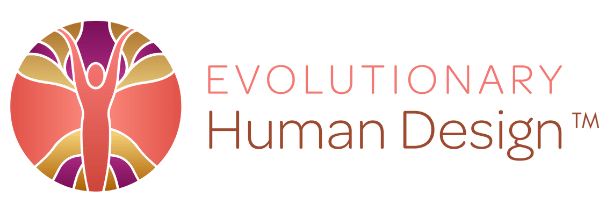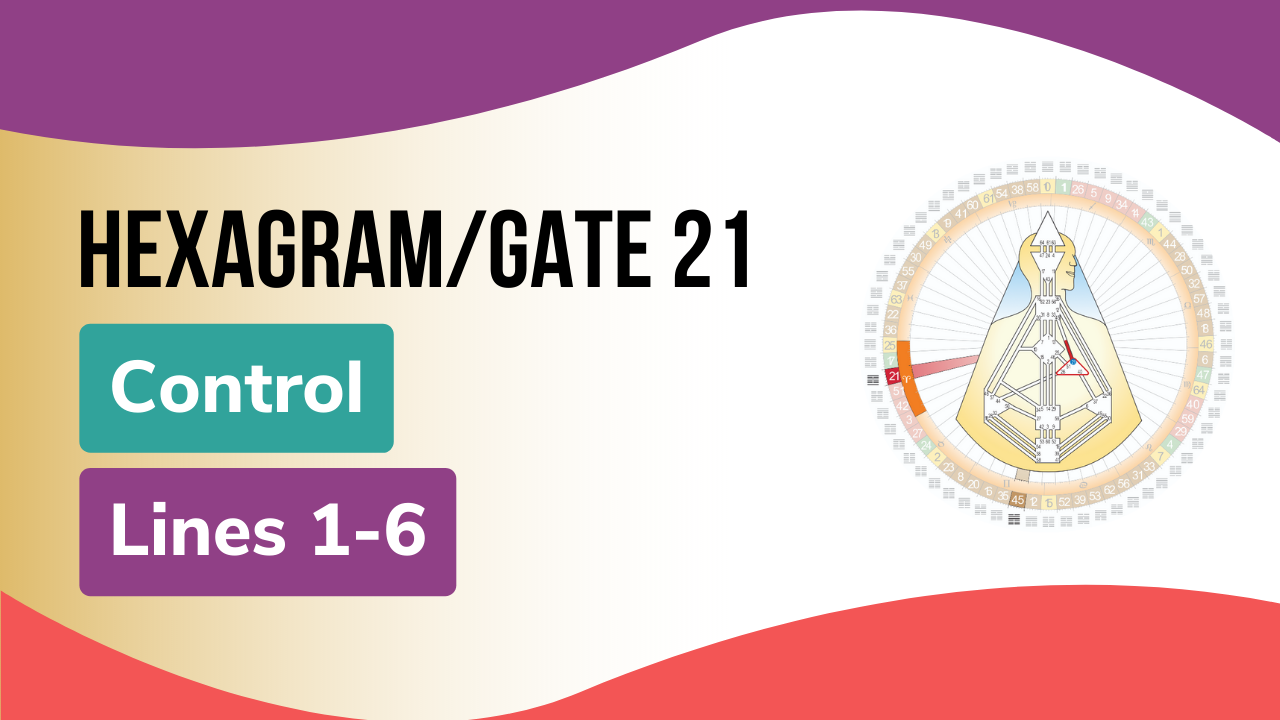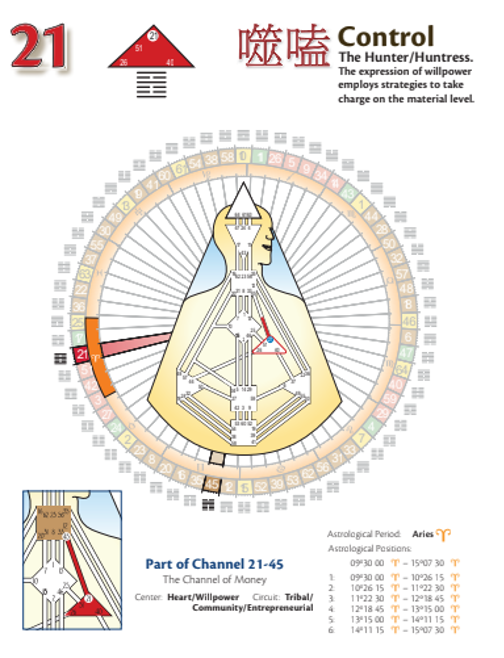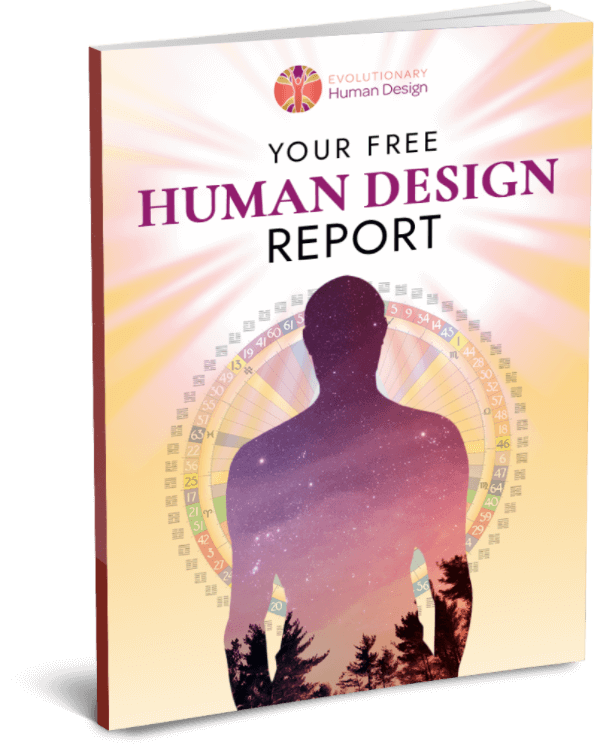What does it mean to have Control? Do we actually have control in our lives? And if so, how do we learn to wield that control in ways that are both advantageous and responsible? Gate 21 in the Human Design Chart points us in the right direction.
Last time, we explored Hexagram 17, learning how to follow the threads of knowledge, wisdom, and thought forms that help us all to progress, blossom, and expand towards an assured future. Now, the Sun is moving into Gate 21, which is the Gateway we call “Control.”
On the other end of Gate 21 is Gate 45, and together they make up what we call the Money Channel. And while having this Channel does not necessarily mean you’re guaranteed to get stinking rich (that all depends on how you play the rest of your Design) it does mean that somehow or other, you’re going to have to get very comfortable with material things (wealth, property, etc.).
Gateway 45 is the gateway of “the Ruler.” The 45 is the king or queen, the one that has the last word, the one that is responsible for being at the top of the food chain and handling the resources. Gate 21, on the other end, is in control of how these resources are put together and funneled so that they can be put into use.
The other name for the 21st Gateway is “the Hunter.” If you’ve ever been hunting, you’ll know there’s two different ways to go about it. One way is to put on your running shoes and go chasing after your quarry. The other way is to work out where your game is going to be, place yourself accordingly, and wait for it to come to you. Of course, recognizing in the first place whether something is worth your effort or not, is important.
So, in this arena of control, there’s a lot of strategizing involved. It’s all about efficiency. Don’t go burning off your energy chasing after things when there’s a much easier way to make things come to you.
Let’s take a look at Gate 21 in the Human Design Chart line by line:
First Line: Being Responsible
The first line provides the foundation for the whole Hexagram. And here, the line is called “Being responsible: Correcting your small mistakes allows for easy growth in life.” It’s a learning curve wherein we find out what we can take control of and what we can’t.
What are the foundational things in our lives we can control? We can control our diet, we can often choose where we live, we can control what we wear. We can control our physical bodies in space—how we walk, move, drive a car, etc. But I think the most important thing we really need to pay attention to is our attitude. How do you control your attitude to life? Are you aiming your attitude toward things that naturally bring you value?
Mistakes are natural, but need correcting, responsibly, to avoid having problems later. What are the things you can control and what are the things that are completely out of your hands? We’ve all known people in our lives who might be called “control freaks.” Some people just refuse to let go of anybody or anything in their life. They have to have a grip on it at all times. They have trouble realizing that this control is not doing anyone any good. There is a call to recognize what is, and what is not, in your control to have responsibility over.
Second Line: Courage
The second line is called “Courage: Giving and receiving correction for any necessary reforms.” Here, we have to be very deliberate, literally grab the wheel, be courageous, take control of a situation.
Your willingness to move beyond poor life standards often requires strong remedies. Sometimes you really do have to buckle up and get to it. Sometimes you’ll see that something is going wrong, and nobody is handling it. So, you’ll step up, exert your courage, and get involved to make sure it turns out right.
The other side of it is that any reluctance to achieve reforms results in losing your sense of responsibility. When you let something go that you could’ve handled sooner, or dealt with in a better way, it can start to wear on you and erode your confidence as time goes on.
Third Line: Hesitating
The third line here is called, “Hesitating: Being potentially overwhelmed by apparent circumstances.” Third lines always have an experimental nature. They are risk takers. But sometimes the risk can be too much. It can be overwhelming, leaving you wondering what to do. So, there can be a certain degree of powerlessness here in this third line of control. A certain degree of letting go and letting the world, the Universe, take its course.
There’s the potential here for getting caught up in other people’s ego issues, which affects your level of commitment in life. We’re living in a world where there are a lot of ego issues. Just one look into the political scene can make your head spin. And Gateway 21 could sometimes be called the Gate of the politician: “how do I get the votes? How do I get the resources? How do I raise my profile in congress or parliament?” And the third line can often wonder, is it even worth getting involved here or not?
You’ll suffer at the hands of those in power unless you follow your own material path. And this again comes down to focusing on, and taking care of, the things you can control. Can you control things on a material level? Can you get your financial situation together? Can you make that work for you, even while those in power are on their power trip?
Fourth Line: Biting the Bullet
The fourth line is an echo of the first line. The first line is about being responsible in your use of control, and the fourth line is called “Biting the bullet.” When it comes to crunch time, you’ve got to take it on, you’ve got to deal with it. You’ve got to engage with all situations in life, all while using great self-control.
Fourth lines always have the influential quality of drawing other people in or being involved in other people’s circumstances. And there’s a certain fragility in all fourth lines. It asks, “Do they trust me? Do they want to be involved with me?” And here you easily establish your authority by weighing up any environment and the people in it. You need to see who’s with you, who recognizes that you’ve got the gumption. From there, it’s important to get clear on what it is you are doing and use great self-control regardless of other people’s input.
You expand into material success through strategic moves and not by conditioned reflex. The word conditioning comes up a lot in Human Design, particularly in the undefined Centers, where we tend to take on other people’s ways of doing things rather than sticking with our own Design. But when you do stick with your Design, you can make these strategic moves. This goes back to the idea of the hunter. You recognize the game, you see where the game is headed, and you work out how to get the game to come to you.
Fifth Line: Being Gallant
The fifth line is the leader, the guide. You oversee things, you have the vision of where things need to go. And here, the line is called, “Being gallant: Considering who merits the responsibility to bring the best reforms.”
You control material matters by using your willpower directly, or by delegating. You find those who are competent and capable, who can take control of a situation, who can take instruction if it’s needed. Who can you delegate to?
You easily apply your willful authority for the ultimate benefit of everyone. That is the fifth line: the natural leader. You know what’s wanted. You know what’s needed. And you know it can be made to happen. The other side of it is slightly more egocentric. There can be a tendency to insist on your way regardless of any consequences. And when you do that, you risk becoming alienated.
Sixth Line: Amending
The sixth line is called “Amending: A delicate touch can bring needed adjustments to any situation.” It’s just that finger on the wheel that turns the wheel just a little bit, and suddenly we’re going off in a totally different direction. A little adjustment to the financial columns and suddenly the wealth starts flowing.
We see this in our relationships with other people too. Do they need total control to sort out their issues, or do they just need subtle reminders? Little adjustments here and there to clean up their act and turn the situation into a win-win.
Displaying your willpower in any situation will automatically bring about changes. You can force the issue. You can push. But if you take on everybody else’s stuff all the time, sure enough, you’ll get worn out. So, it’s important to get really clear on what merits your control and what doesn’t, what’s really needed from you in any particular moment.
It comes back to being very clear on what holds value for you in your life. Does it merit engagement? If so, do you have the courage to follow through on it? Do you have the courage of your convictions to make it happen? If so, great, but if not, then you have to really consider things in a different light.
So, there we are, that’s Gateway 21 in the Human Design Chart. We’ll check in again soon. In the meantime, if you’d like to learn more about how your own Human Design Chart informs and shapes your life, get your Free Human Design Report today.




